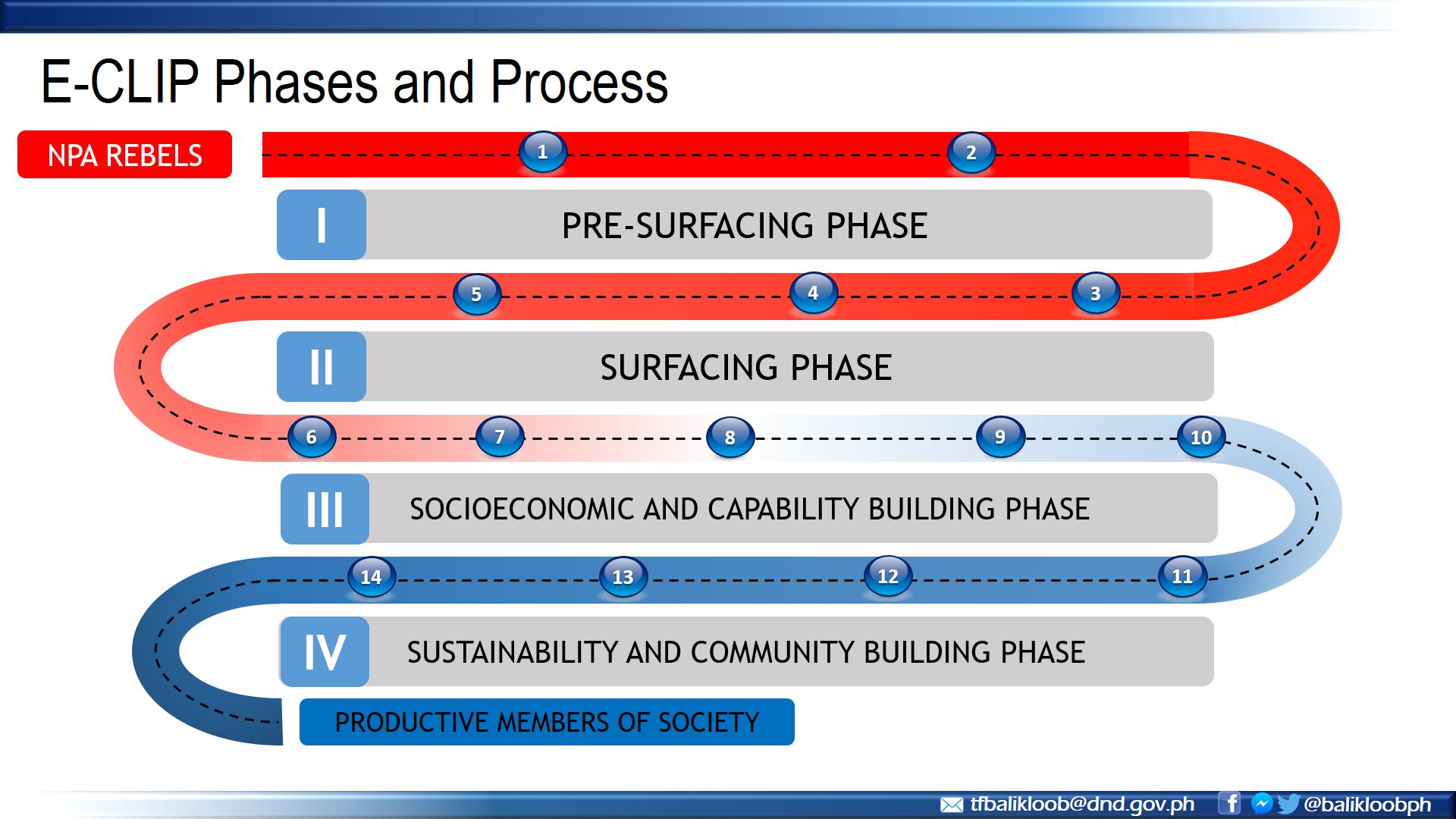



PRE-SURFACING PHASE
Step 1. Rebel signifies his intentions to surface to any of the Receiving Unit
Step 2. Receiving Unit takes primary responsibility in informing the rebel of the program process and endorses the FR to the LSWDO
SURFACING PHASE
Step 3A. LSWDO validates the FR’s name from the databank to ascertain that he/she is not a beneficiary of the previous program.
Step 3B. LSWDO immediately endorses the FR to the halfway house or other available facilities.
Step 3C. At the halfway house, admission orientation shall be conducted by the Center Manager.
Step 4A. E-CLIP Committee ensures appropriate security arrangements and basic necessities while at the halfway house.
Step 4B. Coordination with AFP/PNP units for the provision of security. Units notified submit report to Task Force.
Step 4C. PNP secures surrendered firearms for processing (Circular No. 2015-03 dated April 1, 2015).
Step 4D. JAPIC convenes and submits results to the E-CLIP Committee (ECC) through the LSWDO, copy furnish the Task Force through the UC’s & Bdes, and DILG Provincial/City Director, within two (2) weeks after FR has surfaced. Task Force enters data into the FRIS to monitor the progress of assistance.
Step 5A. With JAPIC Certification issued, FR fills-out the E-CLIP Enrolment Form, assisted by the LSWDO, attested by the DILG Provincial/City Director and approved by the Provincial Governor/HUC Mayor or by his/her designated officer, preferably by the Provincial/HUC administrator of the LSWDO.
Step 5B. With accomplished E-CLIP Enrolment Form, LSWDO facilitates the provision of social protection services (i.e. medical check-up, PhilHealth enrolment) to the FR. This may include psychiatric / psychological services, counselling services and life skills / values formation.
Step 5C. The LGU endorses the requirements for the release of Reintegration Assistance to defray expenses of the Receiving Unit and the Immediate Assistance for basic necessity expenses of the FR. DILG Regional Office facilitates release of said assistance through the LSWDO.
SOCIOECONOMIC CAPABILITY BUILDING PHASE
Step 6. LSWDO, with inputs from FR/CLIP beneficiary, accomplishes the Former Rebel Reintegration Plan (FRRP) Template (Annex E) and Business Plan (Annex F), in consultation w/ concerned agencies (i.e. TESDA, DTI, DA).
Step 7. LSWDO assists the FR in the following activities: Facilitate the issuance of government identification (ID) documents, (i.e. birth certificate, postal ID card); Livelihood planning; Skills training relevant to the identified livelihood project; Training on financial management; Orientation on employment opportunities and actual job referrals as applicable; and Orientation on available educational/vocational training programs. Should the former rebel wish, he/she may also be enrolled in an Alternative Learning System..
Step 8A. The ECC, through the LSWDO, endorses the JAPIC Certification and Enrolment Form for the release of Livelihood Assistance. If the FR has a pending case and is unable to directly implement the project, livelihood assistance shall be provided to his/her identified beneficiary. This will satisfy the government’s commitment to the FR.
Step 8B. If FR has turned-in firearm/s or war materiel, the E-CLIP Committee, through the LSWDO, endorses the requirements, pursuant to Circular No. 2015-03 for the release of remuneration which shall depend on the type of firearm and materiel surrendered. It shall serve as additional fund to support the implementation of the FRRP.
Step 9. LSWDO or designated LGU personnel assists the FR during the encashment of check/s.
Step 10A. The FR is discharged from the halfway house after receiving his/her Livelihood Assistance.
Step 10B. Other assistance as stipulated in the FRRP shall be provided after FR has been discharged from the halfway house. Depending on the FRs plan, either to find employment or to establish his/her own livelihood, he/she shall be assisted in finding employment or should he/she prefer livelihood, be provided with materials and implements in support of his/her chosen livelihood.
SUSTAINABILITY AND COMMUNITY BUILDING PHASE
Step 11A. LSWDO furnishes copy of FRs Profile to the Task Force for reference in the provision of housing. Task Force notifies the National Housing Authority for the issuance of Certificate of Entitlement. The NHA facilitates the provision of housing for FRs at their chosen site. Said housing unit shall be awarded to the FR upon completion of pertinent documentary requirements.
Step 11B. Upon provision of a housing unit to FRs with permanent address, the Conditional Transitional Grant shall be processed. The CTG is worth P5,000 per month for a maximum of two years starting one year after surfacing, subject to the condition that the former rebel will regularly appear before the LGU to ensure that he/she is still active in mainstream society;
Step 11C. Provision of college stipend for the FR or his/her spouse or one child enrolled in a State University or College; and
Step 11D. In furtherance of the interventions, should the FRs decide to venture in upgrading their livelihood projects or business, the provision of loans, financing assistance, access to micro-finance and market access shall be facilitated through the LGU, DTI, LBP, DBP, and DA
Step 12. The PAMANA shall also extend community projects such as agricultural infrastructure, roads, power, water to the communities where the former rebels shall be reintegrated.
Step 13. Six (6) months after the FR have surfaced, and every succeeding 6 month intervals for 3 years, the LSWDO, together with COA, shall conduct visitation to evaluate and assess the progress the FRs reintegration, based on the FRRP. The LSWDO shall submit a report on the result of the visitation to the Task Force.
Step 14. At the end of the three (3)-year period of intervention under the program, the LSWDO shall submit report on the evaluation and assessment of the assistance provided to the FR to the Task Force prior submission to the Office of the President.